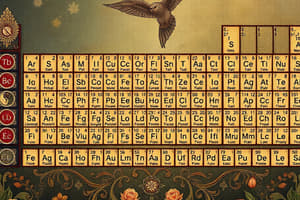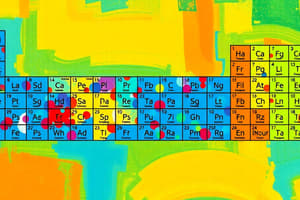Podcast
Questions and Answers
What is the basis of the structure of the periodic table?
What is the basis of the structure of the periodic table?
- The atomic radius of the elements
- The atomic weight of the elements
- The number of electrons in the elements
- The atomic number and properties of the elements (correct)
What are the trends shown by elements across periods and down groups in the periodic table?
What are the trends shown by elements across periods and down groups in the periodic table?
- Ionic radii and electron configuration
- Atomic weight and valencies
- Metallic and non-metallic behaviours
- 1st ionisation energy and electronegativities (correct)
What is the relationship between successive ionisation energy data and the electron configuration of an atom?
What is the relationship between successive ionisation energy data and the electron configuration of an atom?
- The lower the ionisation energy, the more electrons an atom has
- There is no relationship
- Successive ionisation energy data is related to the electron configuration of an atom (correct)
- The higher the ionisation energy, the fewer electrons an atom has
Flashcards
Periodic Table Structure Basis
Periodic Table Structure Basis
The periodic table's structure is based on the atomic number and the elements' properties.
Periodic Trends
Periodic Trends
Elements' properties change across periods (rows) and down groups (columns) in the table.
Ionization Energy & Electron Configuration
Ionization Energy & Electron Configuration
Successive ionization energies reveal relationships with the electron arrangement in the atom.
Study Notes
Structure of the Periodic Table
- The periodic table is organized by atomic number (number of protons in an atom's nucleus) and electron configuration
- Elements with similar electron configurations and chemical properties are placed in the same group (vertical column) of the periodic table
- The periodic table is divided into periods (horizontal rows) and groups (vertical columns) to show recurring patterns of elements' properties
Trends Across Periods and Down Groups
- Atomic radius decreases from left to right across a period due to increased nuclear charge
- Electronegativity increases from left to right across a period as atoms become smaller and more electronegative
- Reactivity increases down a group due to the addition of energy levels and decrease in ionization energy
- Metals become more reactive down a group as they lose electrons more easily
- Nonmetals become less reactive down a group as they gain electrons more easily
Ionisation Energy and Electron Configuration
- Successive ionisation energy data shows a significant increase when an electron is removed from a full energy level or subshell
- Ionisation energy decreases down a group as electrons become easier to remove due to added energy levels
- Electron configuration determines the energy level and subshell of electrons, influencing ionisation energy values
- Ionisation energy data can be used to infer an atom's electron configuration
Studying That Suits You
Use AI to generate personalized quizzes and flashcards to suit your learning preferences.



